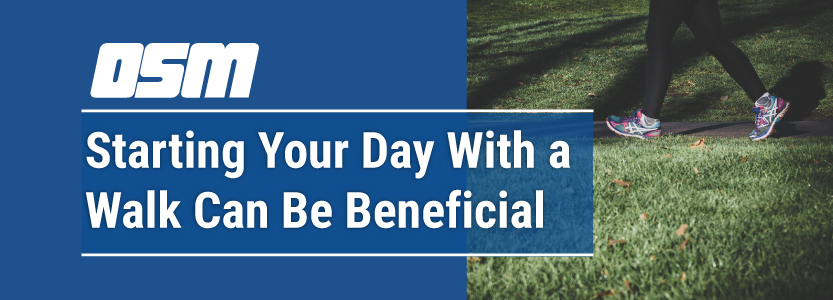Starting Your Day With a Walk Can Be Beneficial
Article featured on Healthline
When you wake up in the morning, movement might not be your first priority. But starting your day with a walk — whether it’s around your neighborhood or part of your commute to work or school — can offer your body a number of health benefits.
Here are 10 reasons why you may want to start your day by getting in some steps. There are also a few tips to seamlessly work it into your daily routine.
1. Boost your energy
Starting out your day with a walk may give you more energy throughout the day. If you walk outdoors, that’s especially true.
Studies show that adults who walked for 20 minutes outdoors experienced more vitality and energy than those who walked for 20 minutes indoors.
A small study found that 10 minutes of stair walking was more energizing than a cup of coffee for 18 women who felt sleep-deprived.
The next time you need a morning energy boost or feel tired when you wake up, you may want to try a walk.
2. Improve your mood
There are physiological benefits to walking in the morning, too.
A walk may help:
- improve self-esteem
- boost mood
- reduce stress
- reduce anxiety
- reduce fatigue
- ease depression symptoms or reduce your risk for depression
For best results, try walking for 20 to 30 minutes at least 5 days a week.
3. Complete your physical activity for the day
One benefit of walking in the morning is that you’ll complete your physical activity for the day — before any other family, work, or school obligations derail you.
The Physical Activity Guidelines for Americans recommends that healthy adults should complete at least 150 to 300 minutes of moderate-intensity exercise per week.
Try to complete a 30-minute walk 5 mornings a week to meet these requirements.
4. It may help you lose weight
Walking in the morning may help you meet your weight loss goals. Walking at a moderate pace for 30 minutes can burn up to 150 calories. Combined with a healthy diet and strength training, you may find you lose weight.
5. Prevent or manage health conditions
Walking can offer numerous benefits for your health, including boosting your immunity, as well as preventing and helping you manage various health conditions.
Studies show that walking for 30 minutes per day can reduce your risk for heart disease by 19 percent. If you live with diabetes, walking may also help lower your blood sugar levels.
It can even help increase your life span and reduce your risk for cardiovascular disease and certain cancers.
6. Strengthen muscles
Walking may help strengthen the muscles in your legs. For best results, walk at a moderate to brisk pace. Try to change up your routine and climb stairs, walk up and down hills, or walk at an incline on the treadmill.
Add in leg-strengthening exercises like squats and lunges several times a week for more muscle tone.
7. Improve mental clarity
A morning walk may help improve your mental clarity and ability to focus throughout the day. A recent study found that amongst older adults, those who started their days with a morning walk improved their cognitive function, compared to those who remained sedentary.
Walking may also help you think more creatively. Research shows that walking opens up a free flow of ideas, which may help you problem-solve better than if you’re sitting or remaining sedentary. This is especially the case if you walk outdoors.
The next time you have a morning meeting or brainstorming session, suggest that your co-workers join you a on a walk, if possible.
8. Sleep better at night
Walking first thing may help you sleep better at night later. A small 2017 studyobserved older adults aged 55 to 65 who were experiencing difficulty falling asleep at night or were living with mild insomnia.
Those who exercised in the morning versus the evening experienced better sleep quality at night. More research is needed to determine why exercising in the morning may be better for sleep than exercising at night, though.
9. Beat the heat
One benefit of walking in the morning in the summertime — or if you live in a climate where it’s warm year-round — is that you’ll be able to fit in exercise before it gets too hot outside.
Be sure to drink plenty of water to stay hydrated before and after your workout. Bring a water bottle with you, if needed. Or, plan to walk along a route with water fountains.
10. Make healthier choices throughout the day
Starting your day with a walk may set you up to make healthier choices throughout the day. After your walk, you may feel more energized and less sleep-deprived.
When your energy drops or you’re tired, you’re more likely to reach for comfort snacks or energy boosters. Walking in the morning may inspire you to choose a healthy lunch and snacks in the afternoon.
Make it part of your routine
- Set out clothing for your walk the night before. Leave your socks and sneakers by the door so you don’t have to look for them in the morning.
- Try to set your alarm for 30 minutes earlier so you can get in at least a 20-minute walk in the morning. Look for a nature trail nearby or just walk around the neighborhood.
- Find a friend or co-worker to walk with in the morning. Chatting and working together can help keep you motivated.
- If you don’t have a lot of time in the morning, consider making walking part of your commute. If you can’t walk all the way to work, try getting off the bus a stop or two early to get a walk in. Or, park farther away from your office so you can walk from your car.
Should you walk before or after breakfast?
If you walk in the mornings, you may wonder if walking before or after breakfast matters and if it’ll help if you have weight loss goals. Research is mixed on whether or not skipping breakfast will increase your metabolism or help you lose weight faster.
Some research shows that exercising in the fasting state (before breakfast) helps your body burn more fat. But more studies are needed.
In the meantime, it depends on your body. If you feel fine taking a walk before eating, or if your stomach feels better if you don’t eat, that’s OK. Or, you may find that you feel better eating a small snack like a banana or a fruit smoothie before heading out on your walk.
Either way, after you exercise, make sure you eat a healthy breakfast and drink plenty of water.
The takeaway
Starting your day with a short walk can offer a number of health benefits. You may feel more energized throughout the day, see your mood and mental clarity improve, and sleep better at night. Be sure to stretch before and after your walk and drink plenty of water to stay hydrated.
If you have more questions, talk to your doctor before starting a new exercise routine.
The Orthopedic & Sports Medicine Center of Oregon is an award-winning, board-certified orthopedic group located in downtown Portland Oregon. We utilize both surgical and nonsurgical means to treat musculoskeletal trauma, spine diseases, sports injuries, degenerative diseases, infections, tumors and congenital disorders.
Our mission is to return our patients back to pain-free mobility and full strength as quickly and painlessly as possible using both surgical and non-surgical orthopedic procedures.
Our expert physicians provide leading-edge, comprehensive care in the diagnosis and treatment of orthopedic conditions, including total joint replacement and sports medicine. We apply the latest state-of-the-art techniques in order to return our patients to their active lifestyle.
If you’re looking for compassionate, expert orthopedic surgeons in Portland Oregon, contact OSM today.
Phone:
503-224-8399
Address
1515 NW 18th Ave, 3rd Floor
Portland, OR 97209
Hours
Monday–Friday
8:00am – 4:30pm




